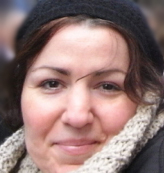#302 Pre-Conference Workshop -Half-Day
Sunday 15 April 2012 10:00 - 13:00 Ramsden Room, St Catharine's
OERopoly: Collaborate and build communities

Teresa Connolly, The Open University and University of Cambridge, UK
Teresa is a Project Officer in the Knowledge Media Institute (KMI) of the Open University, and a Research Associate in the Faculty of Education at the University of Cambridge. She has extensive professional experience in research and teaching in the areas of Geographic Information Systems (GIS), Academic Practice, Educational Technology and OER. Currently Teresa is working on the Responsive Open Learning Environments (ROLE) project, funded by the European Community, and on the Open Resource Bank for Interactive Teaching (ORBIT) project funded by JISC/HEA OER Phase III. Previously she worked as a Lecturer in OER on the OpenLearn project and has researched and developed a number of innovative OER study units related to psychology, project management, Welsh history as well as creating OpenLearn Scotland. Currently she is developing a visualisation of the global OER landscape in conjunction with the UNESCO chair in OER.

Tina Wilson, The Open University, UK
Tina is a research fellow in The Open University's Institute of Educational Technology. Her recent work is in the area of Open Educational Resources having worked on The Open University's Open Content Initiative 'OpenLearn' funded by the William and Flora Hewlett Foundation (USA), the 'Project on Open Content for Knowledge Exposition and Teaching' (POCKET) funded by JISC (UK) and 'Curriculum and Pedagogy in Technology Assisted Learning' (CAPITAL) funded by BECTA (UK). Her current post on the Open Learning network project (OLnet) is funded by the William and Flora Hewlett Foundation.

Elpida Makriyannis, The Open University, UK
Elpida is a Research Associate at the Open University’s Institute of Educational Technology. She has over ten years professional experience in conceiving, researching and designing tools, applications and methodologies for widening participation and understanding user and learner behaviour. Currently working at the Open Learning Network (OLnet) she is involved in an array of research projects and activities, designing, prototyping and testing models and tools linked to OER.

Andy Lane, The Open University, UK
Professor Andy Lane has been at The Open University in the UK since 1983 and held various offices in the former Technology Faculty including being Head of the Systems Department, Associate Dean and Dean. Promoted to Professor of Environmental Systems in 2005, Andy was Director of The Open University’s multi-award winning OpenLearn Initiative (www.open.ac.uk/openlearn) from 2006-10, served as a Board member of the Open CourseWare Consortium from 2008-10; and has worked on a number of UK and European wide OER projects. He has authored or co-authored many publications dealing with systems of open education, especially the use of Open Educational Resources.
Conference Theme: Collaboration
Summary: An opportunity to collaborate and learn more about OER communities across the world by playing the OERopoly game.
Abstract: The aim of the workshop is to offer participants an opportunity to learn more about the wide variety of Global and UK based OER projects through the use of mediating artifacts in a collaborative environment. Participants will play a board game called OERopoly where ‘gaming’ provides them with a grounded and enjoyable experience of collaboration in action.
Different types of mediating artifacts will be used to assist participants in making informed decisions and choices around game-playing and, therefore, mediating their subsequent gaming activities and sharing of OER knowledge.
Mediating artifacts are broadly defined “to include instruments, signs, languages, and machines” [1]. In this context mediating artifacts include the technology and community playing cards, OER project cards, pawns, dice, instruction documents, the participants, the facilitators, and the workshop format. A facilitator will also guide the collaborative activity.
The workshop builds upon the further development of the OERopoly game presented at OpenEd 10, OCWC 11 and OER 11. It also provides an opportunity for participants to acquire more knowledge about a wide variety of OER/OCW projects whilst having an enjoyable learning experience.
1. Creating ideas: Acting and Playing (approx. 90 minutes)
Playing the OERopoly game to explore the relationships between different OER projects, a selection of Web 2.0 technologies and a variety of Online Learning Communities.
Short game rules are explained then participants start playing. The game follows similar rules to Monopoly but with the following underlying metaphors:
Money = Information and Knowledge of OER
“Streets”, Utilities and Stations = OER Projects, OER research hot topics, and Web 2.0 Technologies
2. Discussion (approx. 60 minutes)
A semi structured discussion revolving around the ideas of using games as mediating artifacts and the repurposing of games like OERopoly to reflect local OER circumstances. Ways of representing the relationships between OER, Web 2.0 technologies and online learning communities can also be explored in addition to fostering further collaboration between participants as a result of playing the game as well as addressing the current issues, tools, or topics of interest to the wider OCW/OER community.
References:
[1] Nardi, B.A. (1995) Studying Context: A Comparison of Activity Theory, Situated Action Models, and Distributed Cognition, chapter in Context and Consciousness: Activity Theory and Human-Computer Interaction, MIT Press



